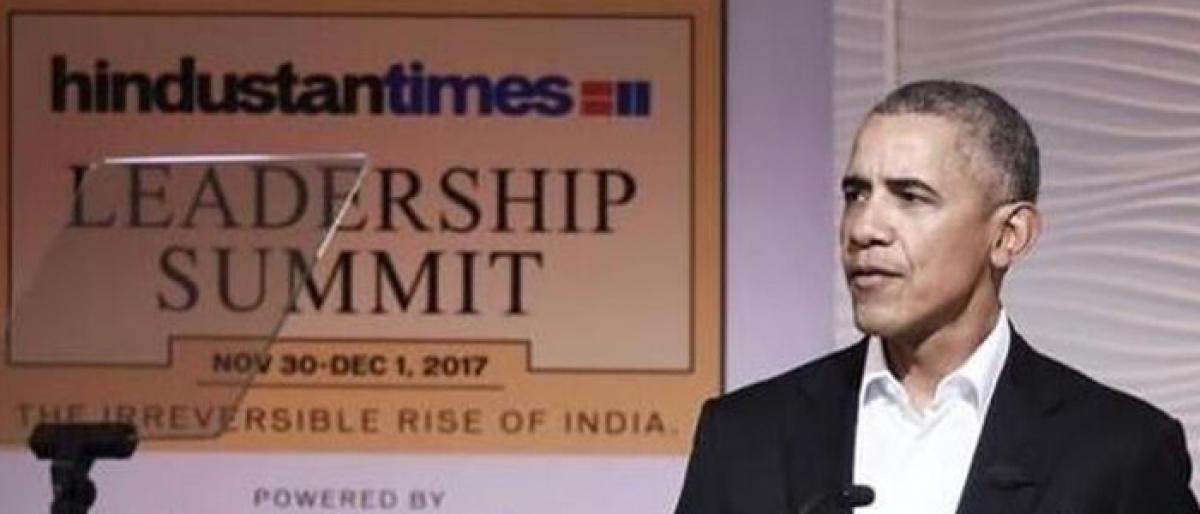Live
- First Impressions and Unboxing of the MacBook Pro M4: A Powerhouse for Professionals and Creators
- China Gears Up for Potential Trade War Amid Trump’s Tariff Threats
- Small Farmers Gain Less by Selling to Supermarkets: Study Reveals
- Why Despite the Controversy, America Is Anticipating the Mike Tyson vs. Jake Paul Fight
- Sanju Samson and Tilak Varma Shine: Record-Breaking Feats in 4th T20I Against South Africa
- India Urges $1.3 Trillion Annual Climate Support for Developing Nations
- Bad air: 106 shuttle buses, 60 extra Metro trips planned to make Delhiites give up cars
- WHO reports declining monkeypox cases in Congo
- CM Attends Kotideepotsavam on Kartika Purnima
- PKL Season 11: Raiding trio of Devank, Ayan, Sandeep help Patna Pirates rout Bengal Warriorz
Just In

Politicians often mirror society and the people of India can strengthen the hands of politicians by speaking out against divisive forces, former US president Barack Obama said on Friday.
New Delhi: Politicians often mirror society and the people of India can strengthen the hands of politicians by speaking out against divisive forces, former US president Barack Obama said on Friday.
Obama made the remarks during an hour-long interaction at the 15th Hindustan Times Leadership Summit on being asked about Prime Minister Narendra Modi’s response when he raised the issue of religious freedom in a private conversation.
Without sharing details of Modi’s reply, Obama said: “I think his impulses are to recognise the importance of Indian unity.
I know that he firmly believes in the need for that in order to advance to the great nation status that India possesses and will continue to amplify in the years to come.”
In democracies such as India and the US, the “office of citizen” is the “most important office”, and it is the responsibility of everyone to speak out against divisive forces and to reinforce such views, he said. Politicians, on the other hand, rarely get too far ahead of public opinion, and often reflect the views of society, he added.
“So, if you see a politician doing things that are questionable, one of the things... is to ask yourself, ‘Am I encouraging or supporting or giving licence to the values that I’m hearing out of the politician?’ Because frankly, politicians tend to be more of a mirror, and more of a reflection of forces in society,” Obama said.
“Every once in a while, they get out ahead and actually lead. But oftentimes they’re reflecting. If communities across India are saying we’re not going to fall prey to division, then that will strengthen the hand of those politicians who feel the same way.”
Obama noted that what he’d said in private to Modi about religious freedom was the same thing he spoke about in public in the US and Europe. People around the world were feeling “worried and insecure” because of wide-ranging economic, cultural, social and demographic changes and missing out on commonalities.
Humans like to make distinctions on the basis of race, religion, gender or class to feel more important than others but there has been progress only when people have “reduced or eliminated barriers of artificial distinction”. “I think those of us, like myself when I was president...Prime Minister Modi and others, our voices have more reach and we have an obligation to deliver these messages but it’s the task of all of us to reinforce it,” he said.
Obama said voices that remind us “that we work well together when we recognise our common humanity” should be encouraged. “Particularly in a country like India where you have such an enormous Muslim population that is successful, integrated and thinks of itself as Indian, and that is unfortunately not always the case in some other countries... I think that is something that should be cherished, nourished and cultivated,” he said. “I think all farsighted Indian leaders recognise that, but it is important to continually reinforce it.”
The importance of individual rights and freedoms and the need to work together were threads that ran through Obama’s remarks at the interaction. Calls for isolation, nationalism and sectarianism, he remarked, “wreak havoc on us all”.
“We have to push against the politics of tribe and build on commonalities,” he said in his brief speech before the question-and-answer session. The US and India have a common set of values, including openness, rule of law and respect for personal freedoms, including the freedom of religion and freedom of the press.
People cannot be complacent about these freedoms and must defend them every day if they did not want them to wither away, he said.

© 2024 Hyderabad Media House Limited/The Hans India. All rights reserved. Powered by hocalwire.com







